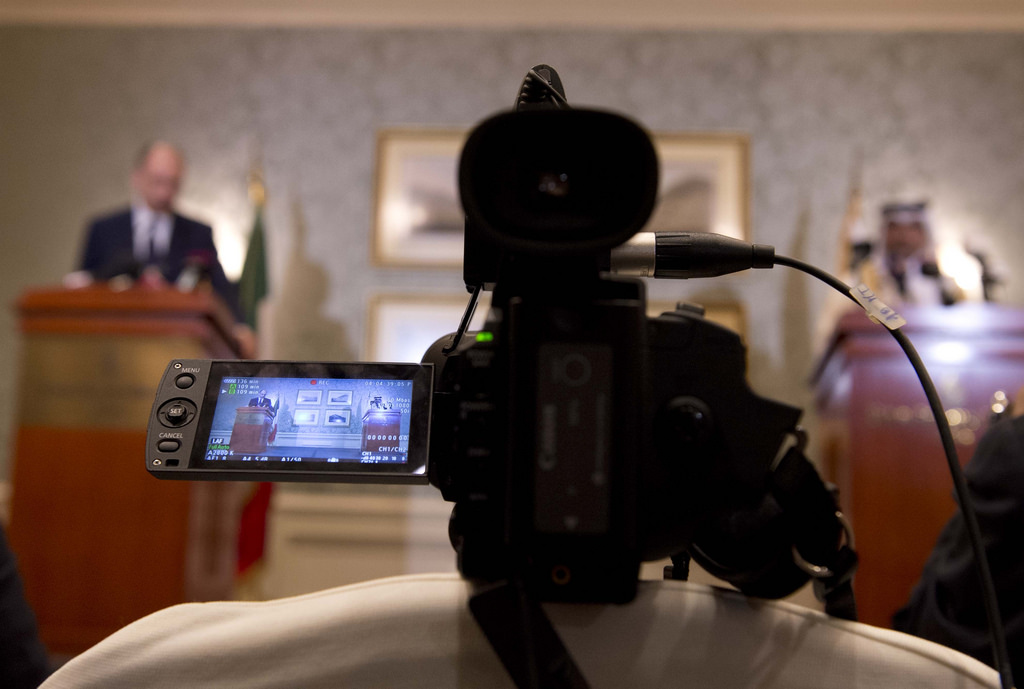 A fronte dei cambiamenti turbolenti dei media, il guru di internet Jeff Jarvis si aspetta dalla formazione giornalistica che insegni ai giornalisti futuri in primo luogo la disponibilità ad adattarsi e ad essere pronti ai cambiamenti.
A fronte dei cambiamenti turbolenti dei media, il guru di internet Jeff Jarvis si aspetta dalla formazione giornalistica che insegni ai giornalisti futuri in primo luogo la disponibilità ad adattarsi e ad essere pronti ai cambiamenti.
Barbie Zelizer, direttrice del programma Annenberg Scholars Program in Culture and Communication presso l’Università della Pennsylvania, in occasione della conferenza sul giornalismo e la ricerca di Winterthur, si è confrontata con questa teoria e con il concetto di schizofrenia nella formazione giornalistica. Zelizer sostiene che giornalisti, professori e ricercatori di giornalismo che vogliono agire nell’interesse pubblico, debbano impostare il giornalismo del futuro in modo più “proattivo”.
Nel suo contributo “Cosa può dirci lo studio del giornalismo sul giornalismo?“ rimprovera alla formazione e alla ricerca giornalistica di avere fin’ora agito in modo reattivo nei confronti del giornalismo, accompagnandone le evoluzioni anziché prevederle.
In particolare ha criticato le seguenti tendenze:
– i ricercatori osserverebbero il giornalismo attraverso „lenti troppo piccole“ e nella formazione le tradizionali linee di demarcazione tra stampa e tv vigono ancora.
– ci sarebbero enormi lacune e fuorvianti manovre all’interno della ricerca secondo le quali alla luce degli innumerevoli “nuovi giornalismi” inventati negli ultimi 150 anni la storia si ripeterebbe „senza pietà“.
– i ricercatori nella scelta dei loro argomenti di ricerca avrebbero la tendenza ad aggirare le complicazioni buttandosi sulle domande di ricerca più scontate.
Zelizer insomma individua le barriere comunicative e gli stereotipi mentali che ostacolano il rapporto tra giornalisti, professori e ricercatori e, secondo lei, contribuirebbero a creare in questi attori un atteggiamento schizofrenico. In ultimo i ricercatori dovrebbero rendersi più accessibili per i giornalisti. Dovrebbero finalmente imparare “a pubblicare in modo che i giornalisti possano capire” e proporre i loro argomenti in modo che siano utili anche alla pratica giornalistica.
Qui di seguito il testo completo dell’intervento in inglese.
What Can Journalism Scholarship Tell Us About Journalism?
I want to begin with a statement made not long ago by online journalism maven Jeff Jarvis, who proclaimed that given the transformative state of journalism today, the most useful note we can offer budding journalists is the need for adaptability and willingness to embrace change.
That statement brought me to a standstill, because the underside of adaptability and its embrace of change – a reading against the grain, if you will – is reactivity and a heightened state of vulnerability to more powerful forces in the environment, a difficulty with asserting one’s voice in a background riddled with competing forces of a technological, economic, political, social and cultural nature. This made me pause, because it suggests that despite extensive curricular and scholarly interventions in and about journalism, we haven’t yet given it what it needs to proactively shape its place in the world.
***
And so, I’d like to take my time here and focus on four questions, each of which plays a bit with the larger issue of how to help journalism take back its destiny and in so doing addresses the relationship between journalism scholarship, journalism and the public interest. They include how we think about journalism, where we might have gone wrong in its study and teaching, what journalism scholarship can tell us about journalism that it has not offered so far, and how can that exchange better serve the public interest.
***
How do we think about journalism?
At a time when journalism itself stretches from personalized blogs to satirical relays on late-night television and its study appears in places as diverse as communication, literary studies, and sociology, asking “how do we think about journalism” requires addressing the fact that journalism seems to be everywhere but is in fact nowhere. Not only has its practice exceeded longstanding recognized boundaries of what journalism is, but the inconsistencies in the backdrop of journalism’s study and teaching have helped create circumstances that plague journalism’s capacity to act on behalf of the public interest.
Although journalism has been around for as long as publics have needed mediated information about the larger world, journal















